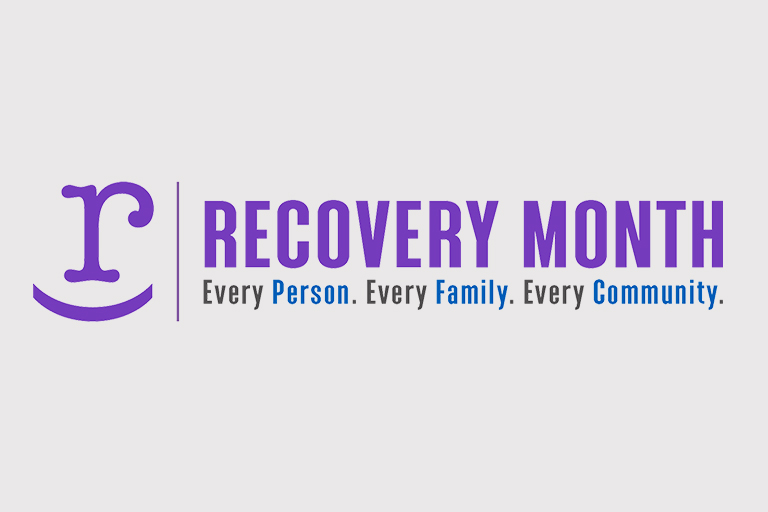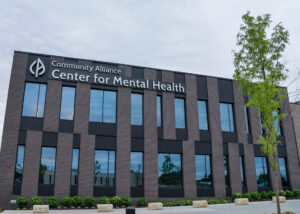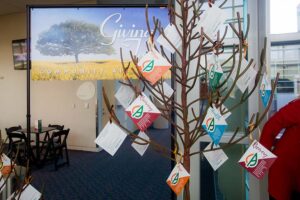Peer Support Specialists Embody the Journey of Recovery

Recovery belongs to all of us. That is the emphasis of National Recovery Month 2022, held this September by the Substance Abuse and Mental Health Services Administration. This year’s theme is “Recovery is for Everyone: Every Person, Every Family, Every Community.”
That belief is what drives Jon Thomsen, Kendra Jones-Devol, and David Arp, all Peer Support Specialists at Community Alliance. Jon, Kendra, and David have each walked—and continue to walk—the path of active recovery as they support others in their community who are struggling with addiction and mental health issues.
“There’s so much work that goes into recovery and ongoing recovery,” says Aileen Brady, Chief Operating Officer at Community Alliance. “Peer support wasn’t a profession ten years ago. It is now a respected profession within the behavioral health field. Jon, Kendra, and David are examples of that proud profession.”
Discovering the Peer Support Profession
Jon Thomsen is a Peer Support Supervisor at Safe Harbor, where peer staff actively assist individuals in alleviating stressful and/or crisis situations in order to avoid hospitalization. His journey to peer support started years ago as he began his own recovery at Community Alliance. When Jon was a patient at Lasting Hope Recovery Center in Omaha, another patient remarked that Jon had a lot of visitors. He told Jon that he would give anything for one person to come visit him.
“I noticed after that moment that there were a ton of people on the unit with me that did not have any support, did not have anybody coming to visit them; it didn’t seem like anybody cared at all,” says Jon. “I just thought, ‘how impossible is that?’ I remember thinking if I could be somebody for them to reach out to when they don’t have anybody else, what better way to spend my time?”
A few years later, Jon did just that when he began working in peer support.
Kendra Jones-Devol’s journey to peer support also felt like it was meant to be. She began her career working with the Iowa School for the Deaf as an intervener for people who are DeafBlind. From there, she worked as a juvenile direct care worker in an inpatient psychiatric residential setting. While she enjoyed the work, she was unable to identify with the clients and share her own experiences with recovery due to the strict nature of the program. After being hospitalized at the University of Nebraska Medical Center in the psychiatric unit, the intake nurse asked her if she had ever considered working in peer support.
“The next month, I took the peer support class,” says Kendra. “I did better in that class than I ever did in any educational setting and was hired out of that class to start working at Community Alliance.”
Kendra is a certified Peer Support Specialist who has now worked with Community Alliance for five years. She currently serves as a grant assistant and works with individuals in services and helps to analyze data obtained through various grants.
David Arp took a similar, winding path to peer support. After being diagnosed with an illness, he took a peer support training class.
“I started to feel that my reason for being here was to help others that had the same conditions and same problems and same situation as I have within my life,” says David. “I felt that I could benefit others significantly with the experiences that I had in my past and help them reach recovery goals within their lifestyle as well.”
David was hired on as a part-time employee. Today, he works on the rapid response team as part of the Central Intake Department for Community Alliance. In this role, he introduces the services to the people that Community Alliance serves—letting them know that they are in the right place to start a journey to recovery.
Providing Integrated Care for People in Recovery
While those in recovery will see many different individuals—doctors, psychiatrists, counselors, and community support workers—working with a Peer Support Specialist is unlike any other relationship. Peer support is not just a service that Community Alliance provides—it is integrated throughout the organization.
“It can be difficult when our field [of behavioral health services] in general is so fragmented and it’s hard to get things done when you have multiple agencies working together,” says Jon. “Community Alliance has become so integrated over the years; we have become a one-stop shop for people seeking integrated care.”
“The successes of peer support may start small, but they lead to significant long-term results,” continues Aileen. “Community Alliance offers safety and security and being able to feel like you can make those next steps in your recovery.”
Each small step leads to the next, but it’s important to know the work in recovery never ends. Recovery is not a static process, it is an ongoing effort—and the support of a peer who is on the same path can make all the difference.
The Value of Lived Experience in Recovery
Peer Support Specialists are individuals with lived experience. Like Jon, Kendra, and David, they draw from personal experiences, giving them an expertise in recovery that simply cannot be replicated. They receive training on how to best use their experiences to help another person who may be going through similar circumstances and offer hope and demonstrate resilience in their own recovery.
“Peer support is mutual by design,” says Jon. “I can’t do my job unless I stay in recovery. As much as I am there to support [others], [they are] also there to support me.”
Kendra stresses that Peer Support Specialists can provide other individuals who are early in their recovery process a sense of hope that they, too, can achieve a level of recovery.
“There’s all these things that you want, and you can’t make it happen,” Kendra says, reflecting on her past struggles. “[I can convey to people] that if you look around and you think to yourself, ‘I don’t want to be this way, I don’t want to live this way,’ you can actually do something about it.”
“We have that unique experience within our backgrounds to be able to relate to all of the different things these peers have been going through, because we were once there ourselves,” says David. “There are a variety of different obstacles that peers have to overcome, and with our profession, we get it. We were once there as well.”
Help Is Within Reach
Community Alliance offers a full range of integrated health services, including primary and psychiatric care, mental health and substance use counseling, rehabilitation and employment services, supportive housing, community, family and peer support, and more.



